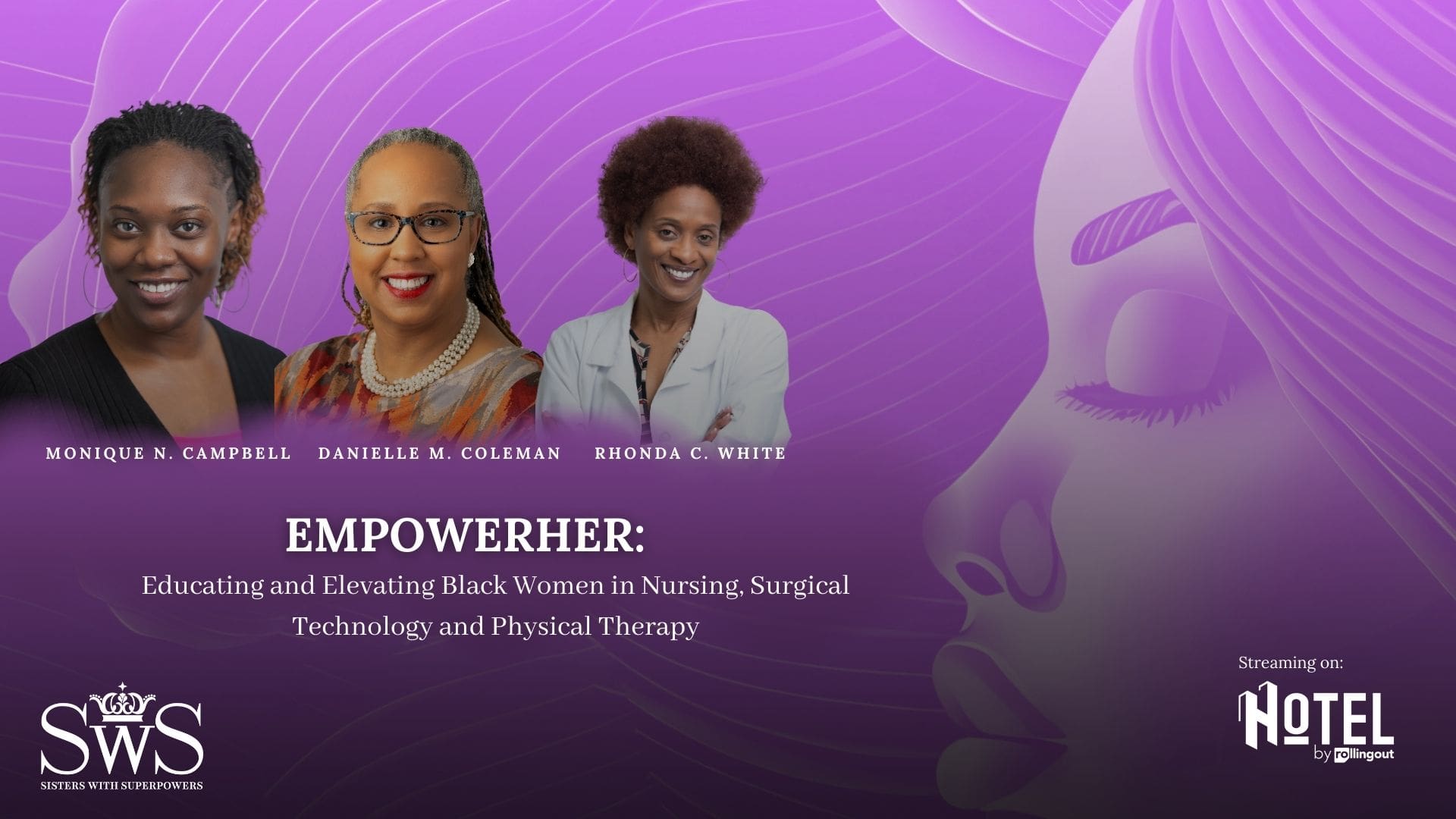Three prominent healthcare workers joined forces recently to give our readers an inside look at what it’s like in the operating room — and more importantly, what it takes to get a job in a place where people put their lives in others’ hands. Dr. Danielle M. Coleman, along with professors Monique N. Campbell and Rhonda C. White gathered as a panel to drop some knowledge on those who had the privilege to hear them in person. We have captured their discussion for your edification here.
Dr. Danielle Coleman: Hello and welcome to our panel. I’m Dr. Danielle Coleman and I’m a Professor of Nursing at Prairie State College in the suburbs of Chicago. I have my Ph.D. in nursing education. I have my master’s degree in nursing, as well as my bachelor’s and my associates starting here at the school that I currently teach at. I teach at Prairie State College and I am joined by my panelists or my fellow panelists, which is Monique Campbell, our surgical tech, and Rhonda White in our physical therapist assistant, sorry, little nervous. So, I’m gonna let them introduce themselves.
Prof. Monique Campbell: I’ll go first. Hi, my name is Monique Campbell, I am the Associate Professor and clinical coordinator of Surgical Technology here at Ferris State College. I have my associates degree in surgical technology, applied science degree. I have my Bachelors of Arts degree in Interdisciplinary Studies, and then I am currently working on my masters of counseling and clinical mental health counseling. As I mentioned before, I am one of the professors for the surgical technology program, and I am also the acting clinical coordinator.
Prof. Rhonda White: Hello everyone. My name is Rhonda White. I am a physical therapist here at Prairie State College. I’m Associate Professor and the Director of Clinical Education. I received my bachelor’s degree in biology from Kentucky State University and my master’s from the University of Indianapolis. The core content that I primarily teach is centered around clinical education, and neurology and complex patient care.
Coleman: Awesome. Okay, so we’re here to talk about nursing, surgical technology and physical therapist assistants. We love what we do, and we want to share our journeys with you to help answer any questions you may have about these areas. Healthcare is very rewarding, and like anything, it has its challenges as well as its successes. We’re going to keep a very casual format, and just have a conversation based on a few questions that we’ve prepared. So, let’s get started. Just so there’s no misunderstanding, each of us will tell you a little bit about our areas, what nurses do, what surgical technologists do, and what physical therapists and physical therapy assistants do. Okay, so let’s talk about our professions and what the day-to-day experience might look like.
Campbell: Okay, I’ll go first. So, the day in the life of a surgical technologist, one, surgical technologist is the person you see standing side by side with the surgeon handing him instruments. So, if he asks, “Can I have a scalpel?” we will be the person to handle that … whatever he needs to complete this surgery, we are the ones responsible for doing it. But the main important part of our job is ensuring that the environment is sterile, which means free of bacteria and contaminants, which helps to prevent surgical infections. So, we are known to be the sterile police, we make sure that everyone is safe and that everyone who comes and lays on the table before us [is] kept safe.
A day in the life, we typically come in, wipe down the room, we pick our cases, make sure that we have all the equipment, all the instruments, any accessory things that the surgeon could possibly want, think he wants, don’t know he needs but we know he needs it. We try to have all those things available. We set up the back table, we set up a main stand, which is what we primarily work off on. We help the surgeon drape the patient, prep the patient for surgery. We also assist the circulator nurse, anesthesiologist, we were basically a team player in the room and we just all work together to make sure that we all provide quality patient care for those who are coming into surgery.
Coleman: Great, that sounds very exciting. And how about you, Ms. Rhonda White?
White: All right. So, a physical therapist or a physical therapist assistant. We are known as movement experts and so we work in a variety of settings. We could be seen in a hospital, we could be seen in outpatient clinical settings, in schools, and home health situations, we serve as people who are under hospice or college palliative care, and also in transitional care units or skilled nursing facilities. In all of those areas, regardless of what the diagnosis is, our plan is to try to get people moving again. So, we work on strength, improving flexibility, balance, coordination, reducing pain, and overall just making [the] patient more efficient in whatever it is that they would want to do. So, we are often called — you’re called the “police,” Monique, we are called the “physical terrorists” because … pain recovery sometimes hurts. But we don’t take pride in causing pain, we take pride in improvement and making people get better.
Coleman: I don’t think I’ve ever called you guys that, but I probably thought it really loud. Okay, and as far as nursing, nursing is an area that actually encompasses so many different spaces. We can be nurses in long-term care, which are like your nursing homes, we can be nurses in occupational health, which is like in your facilities where you work, nurses in the hospitals, which is where a lot of people see them, we can be in a variety of different areas, and nursing can go from the bedside all the way to research. So there’s a different space for nursing all over the place. A lot of people probably know about advanced-practice nurses, which are those nurse practitioners that they may see in place of their physician when they go to the doctor, or even in a hospital setting, or that may come out to their home when they have home health needs. You have nurse midwives, which are the ones who are there to help the babies be born. And again in place of a position and they can be, again, variety of different areas. You’ve got your nurse anesthetist, which are the equivalent of an anesthesiologist, but in a nurse’s body. And then, of course, most people are just familiar with the bedside nurses: I go to the hospital, I don’t feel good, and this person comes in with these needles and these pills, and they’re doing something with this machine next to me, and that’s usually the nurse. So, I guess we’re probably just terrorists across the board.
But nursing can be again in a variety of different areas. And so that makes it beneficial for a lot of people because of how fluid and opportunistic it can be. So, okay, let’s see, what’s the most rewarding part about your profession?
Okay, well, I guess I’ll go first on this one: The most rewarding part about my profession is, it is a profession that seems to be something that will allow a person to make a very good living with an associate’s degree. So, our students here at our community college can come out of a two-year program and make a very good living with that degree that they walk away with. It’s recession-proof, as a lot of people have probably seen. And it is definitely something that everybody needs at some point. So, there’s a space for everybody, I think the most rewarding, one of the most rewarding things is that there’s a space for everybody. There’s labor and delivery and there’s surgery, and there’s ICU and ER, and home health and school nursing and nursing and correctional facilities. And, you know, there’s just so many different areas, there’s college-educated college educators, where we teach those who want to become nurses. So, there’s a space for everybody. When they go into nursing, you don’t have to get pigeonholed into one space. So, I think that is one of the most rewarding but definitely recession-proof. You need a job as a nurse, there are a ton of them out there, so not a problem to find. How about you, Rhonda?
White: Most rewarding thing I guess I would say is that, even though we don’t get a lot of education in psychology and in therapeutic cognitive therapy, I think that we are change agents, and so I would say that it is most important and most rewarding, and that I get to help change people’s lives or help them to return back to what it is that they would want to be doing. And I just find value in that I find that people often suffer in silence and don’t know how to access help and don’t know what’s good for them or what’s not good for them. We kind of go on our own way many times when we’re trying to recover and work and rehabilitation. And so, I love that I can provide support for not only my patients, but my colleagues and my friends and working here at the college, helping students to become more efficient and improving their way of life as well. Funny thing just happened, I just saw one of our deans walking in the hallway, and she had a cane, and she had it on the wrong side, and … she was like, “Well, somebody told me to do it.” I was like, “That’s not right.” So … maybe unsolicited advice is something that is rewarding to me as well.
Campbell: Well, that leaves me! The most rewarding part of being a surgical tech is, typically when someone comes into the OR, they have some type of ailment that needs to be repaired. So, we essentially bring people in broken and release them in a more healed state, even though their body has to go through the healing process, we essentially helped to start that process. So that is, for me, the most rewarding part of being able to be a part of someone’s healing journey, to help them feel better to restore normal function to their body. Sometimes, even just depending on what they do, like it helps their self-esteem and helps how they feel about themselves. It’s just really cool to know that being able to stand side by side with a surgeon who was putting for his best effort to help save a life, change a life, is really rewarding and something I love about the profession.
Coleman: Awesome. All right, this is a tough question, so we got to put our thinking hat on. If someone was interested in getting started in these fields, what should they be working on now, or how would you advise them as far as what they need to do to get started?
White: I’m gonna go first? All right. First of all, I guess I would say, and maybe you all can echo this, I’m sure you will, I think you have to have a willingness to be a good student, I think you have to be a willingness, especially in this day and age to, in some ways be self-taught, and to be an initiator and a motivator for yourself. Like, that’s the first thing. … As fast as our program is, you can’t come in and think, “Oh, this is just going to be given to me.” No, you have to be aggressive enough to seek those things out. I think also, you have to be a critical thinker, so those are some things that you can begin to work on now. I think you have to have great time-management skills, and I think I’m speaking specifically for our program, but I think it goes across the board for any PT or PTA program. I think that for us, the thing that you need to be doing in terms of prerequisites is really just finding out about the profession. Anatomy and physiology is one of our prerequisites, so do that your English skills, your math skills, those basic core content, get that out of the way, so that you can make sure that you are ready to roll when it’s time to apply for the PTA program. And then, lastly, I would say shadowing a PT or a PTA. There are many opportunities, you can call just about any facility and say, hey, I’m interested in your profession, can I come shadow? And most of the time, they will say yeah, so those are the things that I would say, learn how to be a self-learner, a motivator, a self-motivator, work on your critical-thinking skills, take anatomy and physiology, and then shadow a PT or PTA somewhere.
Campbell: For surgical technology, the main thing I would encourage one to do is to determine their why, because the nature of what we do is not for everyone. It’s not a one-size-fits-all profession, and not everyone who walks through that door is built for the OR environment. So, knowing your why is the very main thing that I would say to be prepared for, but also because a lot of people don’t know exactly what we do, we get referred to as surgical nurses all the time, and that’s just not what we do, we’re not nurses, we are surgical technologists. So, I would recommend actually doing the research on what the word is behind the title. Yes, it’s a cool title, but what does that actually mean? So there are YouTube videos of surgical technology and what we do, how we do it, what that looks like, even showing us working in surgery with the surgeon, I know a lot of people watch like the Grey’s Anatomy and all those things like the surgical technologist is an active role in those shows too, so figure out which row is the surgical technologist.
And then, as Professor White stated, like, do your research for prerequisites for the program. The way our program is designed, you have to have your prereqs done before you’re admitted into the program. So, once you’re admitted, you’re only doing program courses, preferably. But take your anatomies, take your midterms, take your microbiology, your English, psychologies, all those things, so that [you’re ready] once you do come into the program. Because it is so tough, and it’s not one of those things that starts here and then comes here, it starts here and goes there. So, it gets harder as time goes, the commitment is like working a full-time job to be in these programs. … Really researching what being in the program would entail before making that commitment and deciding if that’s something you really want to do. And all of that takes me back to my original statement — figuring out your why.
Coleman: Yep, that makes sense. I take you back on everything that they said. One of the things that I probably would advise anyone who is looking at going into nursing, just like my colleagues said, is the rigor of this program is intense, and that is any nursing program, because at the end of the day, you are responsible for somebody’s life, and so you have to know what you’re doing in that moment, even if you don’t know how to do it, or what exactly I need to do. You need to know where to start, and when to go, “Hey, somebody come take a look at this because I think X, Y and Z,” because the patient is putting their life in your hands. And it doesn’t matter what department you work in, or what area of expertise you find yourself with, that’s always going to be the case.
And so I agree with Monique is, you know, finding out your why because nursing school is tough, because we don’t even identify with you is, you know, you’re going to college for nursing, you’ll always hear a nurse say I went to nursing school, because it is a different way of learning. Like Monique was saying we, you know, critical thinking, clinical judgment, these are things that you hear throughout, not only school, but also your career. And so you really do have to learn how to pull out the information and figure out what’s happening and then how to move to the next step. When do I, when do I do this? Why do I do this? What is this happening? You know, we we tell our students all the time that, you know, I can have two patients with the exact same diagnosis, but they’re going to be treated differently, because one treatment … could not do anything for the first person, so there is no, like she said, one size fits all. So, you have to be prepared for the rigor of a nursing program.
Unfortunately, most of our students aren’t because they don’t know how rigorous it is until they get in the program. It’s unlike any other program or degree that you’re going to do, it’s a professional degree. So we are like into like a law student or a doctor or a pharmacist because of the type of program that nursing falls into. So yes, you do have your prerequisites. Some of them require being a CNA, which is a certified nurse’s assistant, some of them that incorporate that into their program, and that’s just kind of like the basis of what a nurse does, because that’s the foundational piece of nursing is the Certified Nursing Assistant. But you also have you know, you need that anatomy and physiology, get to know what the body’s doing, what’s happening, you know, what part goes to what part? And you know, you’ve got your microbiology because you know, infection control and you’ve got your math, because you got to know how much medicine to give, and when you know when to give it, you know, type of thing.
So math is a very big piece of our nursing programs, and that’s across the board. Regardless of what school you go to, you know, English, obviously, I got to know how to write, and, you know, because there’s documentation, legal documentation that I have to be able to provide for either the next nurse who’s going to take care of that patient, or, you know, for the physician to look at and go, this is what’s happened in these eight to 10 to 12 hours that this person took care of my patient. So there are so many different prerequisites that you need to have in place. And each school is a little different as to which ones they require before you come into the program, some of them are implemented as a part of their program, and, and then for others, it’s just, you know, once you get into the core of the nursing classes, that’s when you learn about the disease processes, and you learn about the treatment plans, you learn about the medications, ooh, pharmacology, boy, that’s a word that nobody ever wants to hear. So those are things that you’re preparing for when you’re doing these prerequisites.
So again, rigor, that’s probably the one, one thing that we want our students to understand coming into the program is the rigor, that they’re going to be faced with, if you’re going to give up some stuff, and that’s, I think, I can speak for all of our programs, you’re going to give up some things, you’re going to miss birthday parties and Christmas gatherings, and you’re going to have to maybe cut down on some hours at work or move home with your mom for you know, one to two years, because you can’t work full-time, you’re gonna have to depend on outside help, to maybe, you know, make sure your kids are, you know, doing their homework and might have an after-school program that you’re gonna have to stick them in or, or those are the things that you’re going to have to do, you’re going to say no a lot, because although it’s a short-term program, you know, one to two years, it’s still going to take up a lot of your time. And so time management, just like Professor White was talking about, time management is extremely essential in any of our programs, and I think I kind of bundled that up in a nice little bow.
So my next question is, do we need women of color in these fields? And why? So, I’m going to kind of start that one because mine is a really short answer, yes! One percent to three percent across the country of nurses are black and brown faces, African American and black and brown faces, 1% to 3%. So, you may live in a community that you think, is a lot of people who look like me who are nurses. That’s not true. Out of all the nurses that are practicing currently, in the United States, 1% to 3% of them are black and brown faces. So absolutely, we need more women of color in our field, and I pass the baton on.
White: I will say yes too. I don’t think that any of us would ever say no to that, I believe that representation matters, and I believe as much as we would like to say that I can look at someone and say, “Oh, I can be that,” it doesn’t mean the same thing often if that person doesn’t look like you. And I know that we’ve moved into a world where we’re trying to understand and adapt diversity and inclusion and equity, but we still know from what we come from. And so I know that for me, I’ll give you an example, I was in PTA school about 30, I’m sorry, PT school about 30 years ago, and there was a class of 32 and I was the only African American, I was the only minority in my class, no one else, but me. So while that was hard, I recognize now 30 years later that the reason, my why as Professor Monique, my why, was because I need to be here so that the legacy can continue. So yes, I do feel like we are underrepresented, and we are 4.2% of our population in regard to PTs and PTAs. And so yes, if you don’t believe that someone who looks like you can make it then maybe you won’t, other people have can be intrinsically motivated. But I do feel like seeing feel like seeing somebody who looks like me says that, yes, I might be able to do this work.
Campbell: And I’m just going to piggyback off that. Yes. I know in my graduating class, I started with three African American females and I’m the only one who graduated, so it is a rarity. And I think it goes back to what Professor White says that, having representation lets those who follow us know that “I can do this too.” And because people don’t really realize what we do, as surgical technologists, they automatically assume that it’s for those who have the resources to go to school. They kind of think of it as us going to medical school or something like that and while it is hard, it is a community college program, so it is accessible to everyone. So having someone who looks like you is an inspiring factor to say, “Hey, I can do that, too.”
Coleman: Yep. Okay. And so, to keep within the timeframe, I’ve got one last question, and my one last question is, do you have anything you would like to add to the conversation that we’ve already had that you were like, if I could just say one thing about my profession, it would be this?
Campbell: I’ll go first. I know one of the questions we overlooked is the job market, there will always be room for surgical tech. Someone will always need surgery, and because we can work in surgery center environments, ORs, private practice office, there will always be the need for us, so hey, check us out.
White: And I would echo that same thing. In regard to physical therapist assistants right now currently, our job market does that average salary is about $57,000, and I think that’s important to note, because of the length of our program, all of our programs are smaller in number 19 months is what I’m trying to say. And so for someone to be able to come out and make a substantial living with 90 months of education, I think that says a lot, and I think that that means something to us, many times now. School is so expensive, I guess that’s what I want to say, that my daughter is getting ready to go to school now, and we’re looking at $15,000- and $16,000-a-year programs. And I worry about students like that, because if they’re getting a degree that is not terminal and does not afford them opportunity to go into a field right away, then they’re looking at another $100,000 or $300,000 to get their terminal degree. And so, if you are looking at a way to step on up into our profession, physical therapist assistants is the lesser of the two degrees, but you can start making some money and then you can achieve your Doctor degree if you so choose. So I think that’s important for us to know, school is so expensive, now, so many people are not going to college. But guess what, we do not want to be 20 years out and have nobody but Tiktokers in our lives, we need doctors, we need nurses, we need surgical technologists, because they’re going to be taking care of us, and so that’s what I want to say. That’s all.
Coleman: Okay. And for nursing, you know, I echo what my colleagues have said, you know, and thank you, Professor Mo, for bringing us back around to the job market. Nursing, everybody knows nursing, you know, and so the job market is wide open, we are desperate for nursing. And again, across the country, like we are in such a hole for the need for nurses, because we’ve got nurses who are retiring nurses who are moving around in the community. And so there is, you can look on any job market board and find, you know, pages of the need for nursing in a variety of areas. So nursing is a wide open job market, including with an associate degree. And most of our students over … let me rephrase that our students can come out into the community making somewhere between [$75,000] and $80,000 with an associate degree. And so that says a lot, and that’s just at a base salary, that’s not including all the extreme over time, that a lot of them will go out and do because they’ve been broke long enough. So, they’ve got things that they want to do places they want to go, and so you know, the money is there. So that’s one of the great things about nursing is again, recession proof, you know, the money is there, and like, you know, Professor White said, we need you all to come take care of us. I don’t, I’m afraid if I go into the hospital, and it’s just like, well, we have one nurse and 45 patients, but what? So, yeah, the opportunities are there and obviously they pay very well.
Well, great. We had a wonderful time talking to you guys. Thank you, everyone for joining us today. Thank you for rolling out for giving us this opportunity to talk about our amazing different areas of healthcare. If you’re in the Chicago area and wants to pursue an education at Prairie State College, please visit our website, which is prairiestate.edu, again, prairiestate.edu. Again, my name is Dr. Danielle Coleman and on behalf of my colleagues, we want to thank you and you guys have a wonderful day.
White: Thank you.
Campbell: Thank you.










